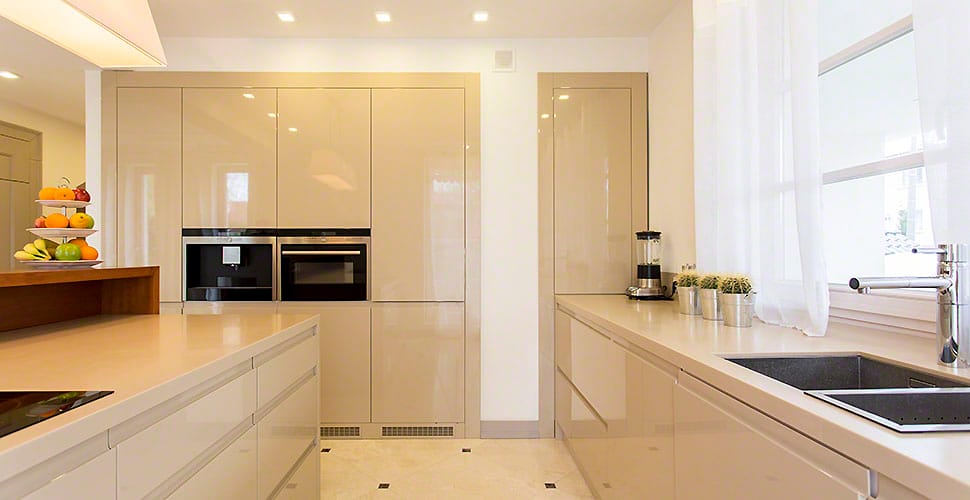Choosing a durable, aesthetically pleasing stone adds to the overall outlook of your kitchen. With that, quartz kitchen tops are becoming quite popular homeowners.
If you’re considering installing quartz in your kitchen, what aspects are you keeping in mind?
Well, an experienced and wise friend will advise you to consider the thickness of the countertops as well, along with the design, color, and size.
Here’s how you can choose the thickness of your quartz countertops.
The Thickness Of Quartz Countertops
Selecting the thickness of quartz worktops mainly depends upon the kind of usage. And then comes other aspects. Before going through all the details about why you should choose a particular thickness and how to, let’s see what options you have.
Usually, quartz countertops of 2-3 cm thickness are used. Read further to see what these two opposites have to offer.
There are three types of thickness of quartz worktops offer:
- Ultra-thin (1-1.2cm)
- Thin (2cm)
- Thick and strong (3cm)
Why Do You Need Thin Or Ultra-Thin Quartz Countertops?
Thin countertops add a sleek and stylish feel to your kitchen. For your minimalist space, a thin or ultra-thin quartz worktop will go best. A cherry on the top is the affordable price of thin countertops.
Also, these countertops are pretty easy to install with this thickness. Due to their thin material, no adhesive is required for the installation, such as a continuous substrate or full mortar bed. Just simply place the slabs on the exposed webbings of cabinetry.
Moreover, the stylish and modern look of these countertops is often advertised in home décor magazines. They’re affordable, easy to transport, fabricate, and install.
Why Do You Need Thick Quartz Countertops?
The thickest the stone, the stronger it will be. Therefore, durability is the main reason for you to install 3cm quartz countertops. But, if they’re thick, that doesn’t mean they appear rough and dull. In fact, thick countertops are the most classic option for you.
Their contemporary look will add to the aesthetics of your kitchen. And if you want quartz for a busy kitchen, a 3cm would be best. Also, for the commercial kitchen, thick quartz slabs are the highly desired option.
And if there’s a joint or seam between your two slabs, choose thicker ones. In this way, the seams will expose less, which will add to the overall value of your kitchen. All-in-all they’re heavy-duty and more durable.
Things To Keep In Mind Before You Choose The Thickness Of Your Countertops
Area Of Use
Where you’re supposed to install the quartz matter a lot while choosing its thickness. As mentioned before, a heavily used kitchen needs a 3cm thick worktop to carry the wear and tear. In the same way, thin quartz slabs are usually installed in bathroom vanities and showers.
More so, the thinner slabs serve for the décor purposes. The areas where 1-2 cm of countertops are commonly installed are:
- Wall Coverings
- Backsplashes
- Fireplace surrounds
- For bathroom vanity and ornaments
Homeowners prefer a 3cm of thickness for kitchen countertops. It will add to the sale value of your home, for these countertops will survive long.
Budget
Considering the budget, thicker kitchen countertops cost more than thinner ones. Also, the transport, fabrication, and installation top up the cost of thick quartz countertops. And because the thinner ones are fragile, they need extra care while transportation, which costs extra bucks from your wallet.
Overall, calculating and comparing the total cost later revealed that buying and installing 3cm quartz countertops cost more. But the durability these worktops provide is worth the money. While the counterparts, thin and ultra-thin countertops, fail to provide long-lasting services. You need extra care while using thin slabs in your kitchen. Otherwise, you’ll have to pay for the repair or replacement of these worktops.
Support
It is an important point that you need to consider. Heavier slabs need no support. While in the case of thin worktops, they need structure beneath them for support. And if there’s a hangover, the chipping and cracking chances will increase for thin quartz countertops. You need brackets to support 2cm worktops.
Also, if your house is old, the structure of cabinetry is weak to support thicker slabs. You need thin quartz countertops. However, you should take advice from a quartz countertop installer Rockville in this matter.



